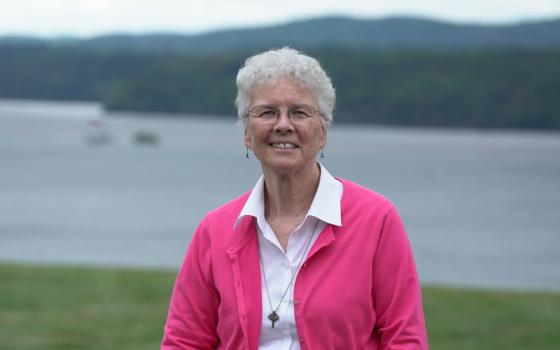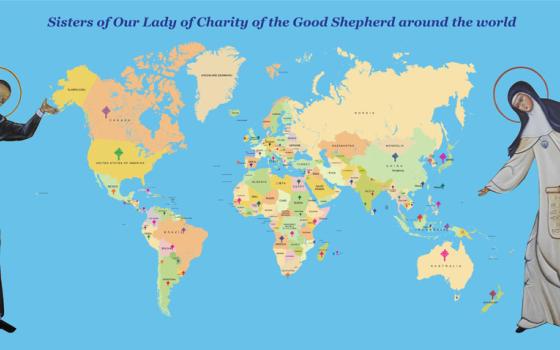It's been over 175 years since a small group of Sisters of Our Lady of Charity of the Good Shepherd landed at the southern tip of Manhattan after 30 miserable days crossing the Atlantic Ocean aboard the immigrant ship Utica. Sent from France by their foundress, St. Mary Euphrasia Pelletier, the nuns came to America to attend to the needs of suffering women and girls who could not live at home because of abuse or emotional difficulties.
After being processed in New York, the sisters made their way via stagecoach to Louisville, Kentucky, where they founded the first mission of the order of Good Shepherd Sisters in the United States. They would return to New York City in 1857 to work with female prisoners and their families. That first ministry in Manhattan would eventually grow into Good Shepherd Services, which today offers 80 programs in the New York tri-state area and serves over 30,000 children and families.
It's a legacy that continues to inspire awe and gratitude in Sr. Maureen McGowan, province leader of the New York-Toronto Province of the Good Shepherd Sisters, as her community prepares to celebrate its 175th anniversary May 12. McGowan sat down with Global Sisters Report in her office on the top floor of a Catholic high school in Astoria, Queens.
GSR: How has Good Shepherd Services managed to develop such a large network of social services in a city as big as New York?
McGowan: We've always partnered with bigger agencies knowing that women and girls are going to need these services. That's always been a part of our history. We never set out to build our own empire, but rather, we try to insert ourselves into programs that are already established.
We partner with city agencies and courts. Many girls are remanded to us by the courts because they've been abused or abandoned. Today, all children come to us through the Administration for Children's Services. We work hand in glove with them as their partner.
One of our strongest contributions to social service work is the way we coordinate our youth and family development programs across the fields of education, child welfare, and youth justice, with a special focus on recovering from trauma. We do this work particularly at Collier Youth Services in New Jersey and Maria Droste Counseling Services in New York and Quincy, Massachusetts.
So your ministry expands beyond New York?
We have 4,000 sisters in 76 countries, so we are an international congregation, and we're very mindful of that as a core part of our identity. Some of our most important work internationally has been welcoming young women who have been trafficked. We have been able to create networks where trafficked women can find safe homes, particularly in Europe, because of high numbers of Eastern European women being trafficked. And the sisters are very involved in Thailand, Burma, Indonesia and Myanmar, where the need is unbelievable.
What have been some of the other highlights of your ministry in the past few decades?
We've done a lot of work on the ground, particularly with shelters for battered women and their children. But we have been striving to integrate our spirituality and our desire for justice into our ministries. It's not enough to say that we have a special ministry to women and children. That work must be part of a larger commitment to empower vulnerable women.
We have NGO status at the United Nations, and our representatives there have done a lot of education about this internationally. It's a great way to bring about a sense of community internationally. In this country, we have done a lot of our own reflection and training on justice and peace, which has helped us develop our advocacy network and our child welfare policy. The interfaith advocacy community in Washington, D.C., is very alive and well-organized. So the Good Shepherd Sisters' National Advocacy Center does a lot of work in partnership with LCWR and other interfaith activist organizations.
The Good Shepherd Sisters support five ministries in the New York-Toronto Province and employ over 1,200 people, but few are women religious. How do you uphold your mission and charism with the staff?
We actually call our employees "mission partners." In all of our programs, we have mission effectiveness training, which is like a new-employee orientation. In their first week, they are introduced to our history and our values. Whether you're a janitor or on the board of directors, we want everyone to understand how our charism is expressed in our work.
Once a year, we invite 80 mission partners to Detroit to discuss our mission, and every other year, we send 90 of them to St. Mary Euphrasia's motherhouse in Angers, France, to have a more in-depth experience of her wisdom about serving women and children.
How has your charism developed over 175 years?
We've never changed it; we've only enhanced the way we apply it. We express it by a desire to promote the value of reconciliation. We try to help those we serve to reconcile with themselves and their brokenness and then to reconcile with their other relationships. St. Mary Euphrasia said, "One person is of more value than the world." That seems to get right to the core of what we do to honor the dignity of the person. Our commitment to a philosophy of care is what drew me to the Good Shepherd Sisters, and it's what continues to draw our mission partners. It's very hands-on work.
You have a small core of young-adult Good Shepherd volunteers. Do you see them as an essential part of carrying on your mission?
We have about 15 volunteers every year in the U.S. and Canada. It's a small group because the work can be very intense. From day one, they become involved with traumatized children or women who have been abused for years, often in very poor areas across the U.S. and internationally. We vet very carefully and reject more applications than we take. They are a very special group because they are capable of doing high-risk work right out of college. But I think they love the work because more than a third of them go on to work for Good Shepherd Services. They are so good, competent, professional and caring. I just say thank you.
With the declining number of sisters, do you worry about the future of the ministries sponsored by the Good Shepherd Sisters?
We're not anxious about the future. The mission will continue because it comes out of the goodness in the hearts of our mission partners. It's going to be a different moment 20 years from now.
The need for our ministry will always be there. I don't know what it will look like in the end, but we are doing our part to keep weaving the tapestry so that our network stays alive and healthy. Our desire is that the presence of the Good Shepherd Sisters, whatever that looks like, will be connected to our international family, as well. We invest a lot in our mission partners. So whether or not there are sisters here, our mission partners have a foundation that will help them fan those flames, keeping the mission alive. It all leaves me with tremendous gratitude and hope.
[Jamie Manson is a columnist and books editor at the National Catholic Reporter.]


